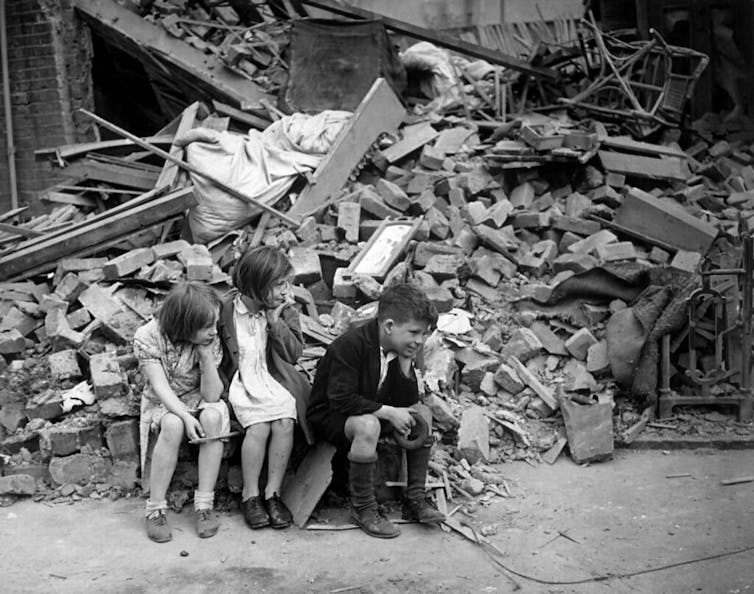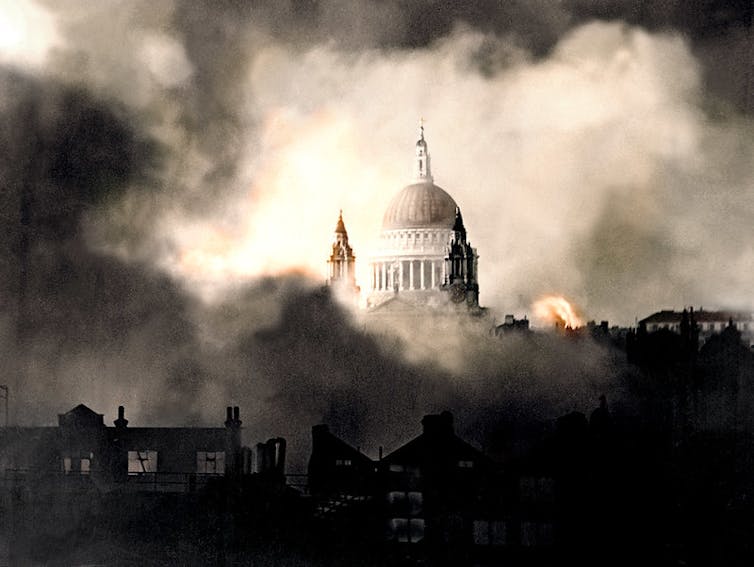Russian general Sergey Surovikin has a reputation for ruthlessness. Appointed the Russian military’s overall commander on October 8, the day the strategically vital Kerch Bridge was targeted by an explosion that badly damaged Russia’s main road and rail connection with Crimea, he has ordered savage drone and missile attacks on civilian infrastructure. Strikes on the capital Kyiv and the north-eastern city of Kharkiv have left large swaths of those cities without water and electricity.
Surovikin clearly hopes this is a strategy that will destroy civilian morale and cripple the Ukrainian will to resist. The 2016 targeting by Russia of non-combatant facilities such as hospitals in the Syrian city of Aleppo offer a model for his approach. But this was backed by Syrian regime forces on the ground. My research into UK newspaper coverage of the second world war suggests his approach will fail.
Germany’s second world war blitz on Britain for eight months between September 7, 1940, and May 11, 1941, for example. In the first phase, London was attacked on 57 consecutive nights. Houses, shops, factories, hospitals and schools were destroyed. Some 43,000 civilians were killed and one in six Londoners made homeless.
These raids were terrifying – but Londoners preferred to disguise their fear. On Sunday September 8, 1940, Eileen Alexander, a resident of Hampstead, noted in her diary:
Another disturbed night on the drawing-room sofa … Bernard, Jean and I were nearly blown out of the window by gunfire from Primrose Hill – but we had a pleasant afternoon in Spite of All [sic].
Prior to the blitz, Britain had experienced few civilian casualties, but now, ministers wondered how people’s morale might be maintained as living conditions deteriorated. Sir John Anderson, the home secretary, worried that Britons might prove vulnerable to mass panic.
Civil servants were ordered to monitor intelligence reports for evidence of the public mood. These indicated that panic was rare and determination to keep calm and “see it through” was the norm. There was, however, much grumbling about class injustice – above all about unequal access to air raid shelters.

As the blitz spread to provincial cities, concern grew that relentless bombing of non-military targets might weaken morale. The German raid on Coventry on the night of November 14 1940 was among the most concentrated of the war. The medieval centre of the city was destroyed and nearly one in three homes rendered uninhabitable. From Coventry, Hilde Marchant of the Daily Express wrote:
It is useless to try to find heroes in this city. Everyone from the children to the chief constable and mayor has been a hero.
In a piece which ran on November 16 1940, under the headline “Mrs Smith Hands out Cups of Tea as the Bombs Come down”, Marchant described Mrs Smith “handing out cups of tea from a mobile canteen”, which she operated throughout the raid. Meanwhile, Daily Mail correspondent William Hall described Coventry as “this brave city where defiant Union Jacks flutter from reeling, twisted lamp posts”.
You would expect reporters to emphasise people’s courage and resilience – but these qualities really were on display. Germany’s bombing did not destroy Britain’s morale. It caused death, suffering and acute misery, but the most common reaction was captured in Hilde Marchant’s report that “The whole of Coventry cries: BOMB BACK AND BOMB HARD.”
Defeatist message fell on deaf ears
The Communist Party of Great Britain (CPGB) alone took a different line. Locked into support for a negotiated peace by Stalin’s non-aggression pact with Hitler, the CPGB’s mission was to persuade working-class Britons that their suffering was futile. Through the pages of its newspaper, the Daily Worker, it promoted the view that shortage of deep air raid shelters in poor areas was the consequence of deliberate anti-working class prejudice.
In January 1941 temperatures fell so low, it was reported that water froze in fireman’s hoses. The meat ration was cut from two shillings and twopence per week to one shilling and twopence. German bombing was intense in London and cities throughout the country.
The CPGB exploited misery ruthlessly in its crusade for a “People’s peace”. Its efforts peaked in a high-profile event, the “People’s Convention” on January 22. Camouflaged as an innocent gathering of the progressive left, this united 2,234 delegates in London’s Royal Hotel and Holborn Hall. The Manchester Guardian (as it was called until 1959) described it perfectly as a carefully manipulated agent of communist propaganda into which “many excellent but gullible people have been enticed”.

Ministers were so concerned about the CPGB campaign that, on January 21 the new home secretary, Herbert Morrison, banned the Daily Worker. The cabinet need not have worried – the People’s Convention failed to inspire significant hostility to the war effort.
Bombing campaigns rarely succeed
It should not have taken the wartime coalition long to understand that German civilian morale might be no more vulnerable to RAF bombing than British citizens had been to attacks by German bombers.
But training and equipping land forces to open a second front in Europe was a slow process. And, when Russia entered the war on the allied side, Stalin demanded action. So, long before D-Day, the RAF and US Air Force responded with colossal raids against German cities.
Compared to the 43,000 British civilians killed in the blitz, the estimates of German civilians killed by Allied bombing range as high as 600,000. Like Britons before them, Germans emerged from air raid shelters, shaken and exhausted. They shook with terror amid colossal explosions. But they did not demand compromise, still less surrender. British policymakers had no compelling evidence to suggest they might.
Another important precedent backs this up. American bombers unleashed the heaviest air raids in history during the Vietnam war, without compromising North Vietnam’s ability to fight on.
Surovikin, who is known as the “Butcher of Syria” faces a familiar dilemma in Ukraine. He must decide whether savage bombardment of civilian targets will advance the Russian cause. The likelihood is that it will consolidate Ukraine’s already passionate determination to resist.
Wars are not won by bombing campaigns alone – a successful aggressor must take territory. Ukraine will have a tough winter, but unless Russia’s bombardment is backed by a dynamic ground campaign, Surovikin’s strategy owes more to desperation than strategic purpose.
Tim Luckhurst has received funding from News UK and Ireland Ltd. He is a member of the Society of Editors and the Free Speech Union and a member of the Editorial Board of The Conversation UK. His book, Reporting the Second World War - The Press and the People 1939-1945 will be published by Bloomsbury Academic on 9th February 2023
This article was originally published on The Conversation. Read the original article.







